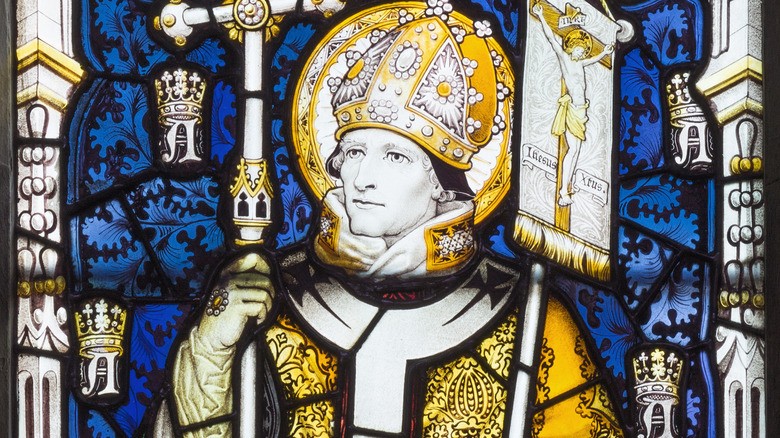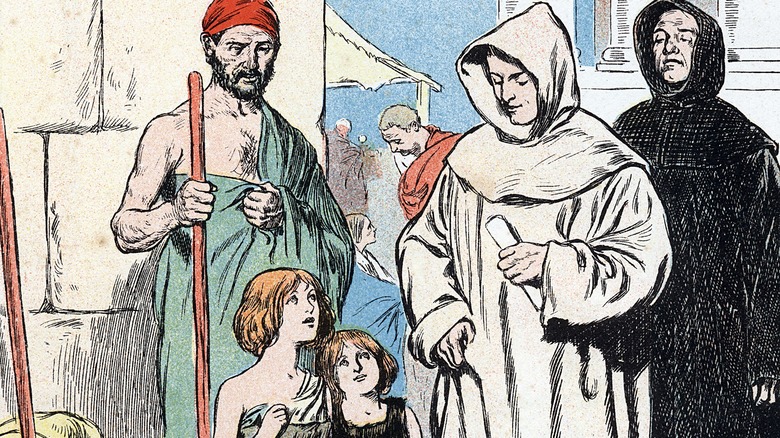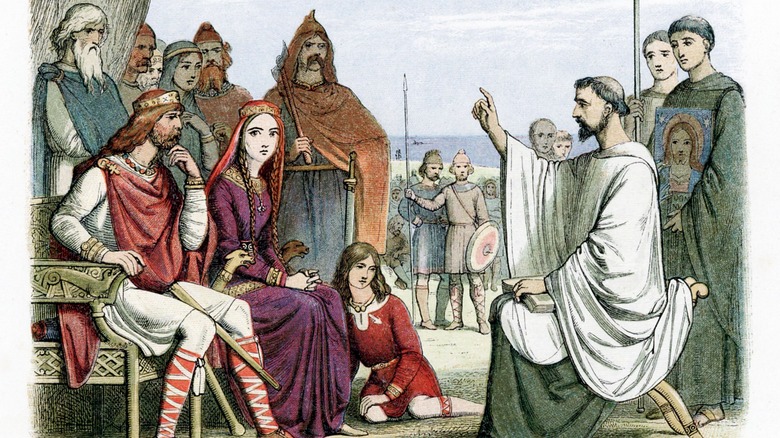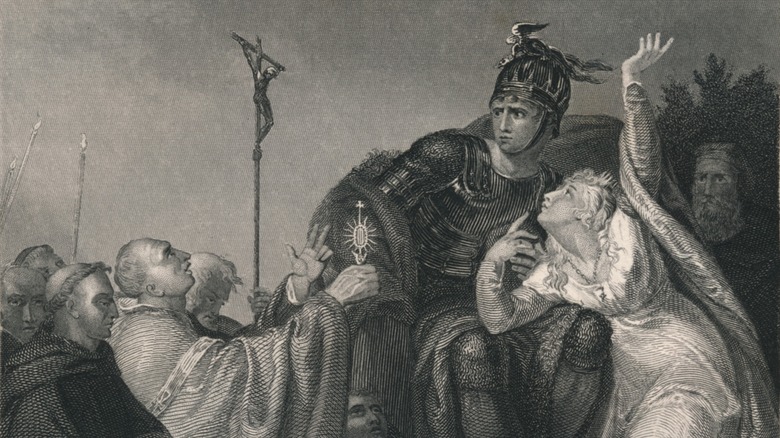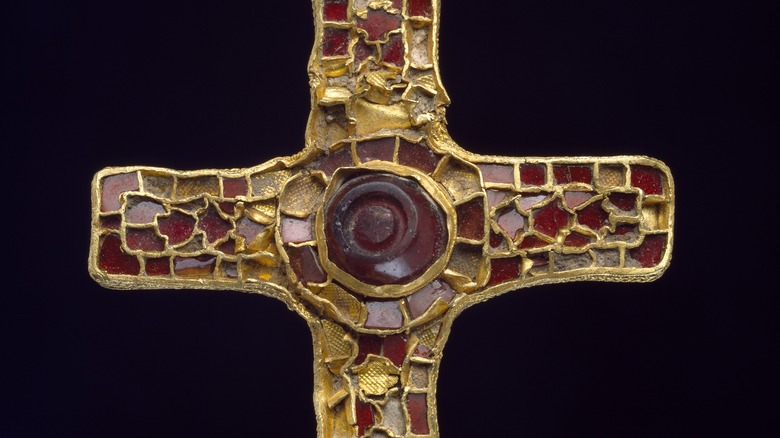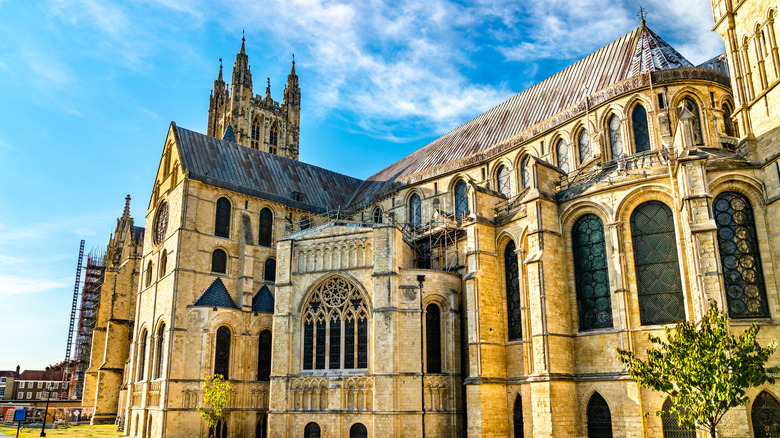Why Augustine Of Canterbury Had A Very Busy Christmas Day In 597
Almost two centuries after the Romans left Britain, the rainy island on the edge of civilization had once again become a wild backwater in Europe, a volatile land divided into many warring states. Britain lost many things when the Romans left in 410, including paved roads, aqueducts, and the Christian religion. Bands of Germanic raiders — the Anglo-Saxons — had settled in Britain in the 5th century, turning it into a predominantly pagan place once more (via English Heritage). It would take one gutsy Roman Catholic monk and missionary, St. Augustine, to restore England to the Christian religion.
Approaching a highly suspicious Anglo-Saxon king in the tiny kingdom of Kent, Augustine made moves to sway the monarch toward his own Christian faith. With extraordinary ease, the monk moved the masses, bringing them to mass once more. His conversion efforts culminated in one of the most important events in English history on Christmas Day 597.
Not Angles but angels
What led St. Augustine, an Italian churchman, to visit the perilous shores of Dark Age Britain? According to legend, the story begins with one of history's greatest puns.
One day Pope Gregory the Great, one of the church's most energetic and effective papal leaders, was walking through a market in Rome when he spotted some exotic foreigners from the far North. These young boys stood out due to their beautiful hair and fair skin. After being told that the enslaved people were Angles from England, Gregory is said to have quipped (via "The Ecclesiastical History"), "Right, for they have an angelic face, and it is meet that such should be co-heirs with the Angels in heaven."
This fateful day supposedly had a lasting impact on Gregory, so much so that after he ascended the papal throne, he organized a mission to convert the pagan Angles to Christianity. St Augustine himself, who is believed to have been a monk, was called up along with 40 others to make the dangerous journey across the ocean (via English Heritage). Augustine left Italy to try and return the English to the Catholic faith — he would not disappoint.
Land of giants
Landing on the small island of Thanet just off the coast of Britain, St. Augustine's party immediately ran into the local strongman, King Aethelbert of Kent (per "The Anglo-Saxons").
While Aethelbert treated the group kindly, he also forbid the monks from leaving, hoping to keep a watchful eye on the strange visitors. The superstitious king was wary that the churchmen might cast a magic spell on him. According to Bede's "Ecclesiastical History," he asked the Christians to meet him outside to prevent sorcery. At the meeting, the monks put on a show for the locals, carrying a silver cross and chanting the liturgy. Initially, Aethelbert responded that he would not abandon the religion of his forefathers, but he did allow the strangers to reside in his kingdom to preach their faith. The group was permitted to settle in Canterbury, where they began to proselytize to the pagan locals.
The missionaries were by no means the only Christians on the largely pagan island, and traces of the old faith remained. The Indigenous Celtic Britons in Kent were still worshipping at the grave of a Roman Christian martyr when the Italians arrived — although the worshippers had lost all knowledge of who he actually was (via "The Rise of Western Christendom"). In general, the illiterate inhabitants of Britain had lost all understanding of their past, and many people even believed that the impressive Roman ruins around them were the work of ancient giants (per "The Anglo-Saxons").
Happy wife, happy life
How did St. Augustine finally sway the cautious king, along with many others, to Christianity? Some people believe his wife was a key factor. Aethelbert had picked up his spouse Bertha in France, and the Frankish royal was already a devoted Christian who had even taken a bishop with her to England (via English Heritage). Even if she did not help to convert him, Bertha did make Aethelbert an easy target among English royalty because he was already well aware of the power of the Catholic Church on the continent (via Historic UK).
It is also possible that Pope Gregory himself helped to win Aethelbert around; he assisted Augustine in his mission by sending Aethelbert many exotic gifts and flattering letters (via "The Ecclesiastical History"). Gregory's show of generosity was an obvious flex that could easily have turned the head of a petty king. Whether or not his conversion was sincere, Aethelbert's move toward Catholic Christianity would have cemented his power and reach abroad. According to tradition, he converted on Whit Sunday — "the seventh Sunday after Easter, when Christians celebrate the sending of the Holy Spirit to the first followers of Christ," per Collins English Dictionary — not long after Augustine arrived.
Augustine reportedly baptized 10,000 people on Christmas Day 597
With the king's backing, St. Augustine's success was assured. His tiny base in the city of Canterbury grew and grew, and he was made the city's archbishop, the first head of the Church in England (via Historic UK). At least according to Augustine himself, his team's conversion efforts gathered some staggering momentum in the months that followed. Why he was so successful we do not know, but we do know that the missionaries were cautious and intelligent about not offending the locals. Rather than destroying pagan temples and shrines, the pope ordered the group to simply reuse them for Christian purposes once they had been suitably cleansed with holy water (via "The Ecclesiastical History").
Bede also recounts that the monks' remarkably humble and holy lifestyle gained them considerable respect and admiration (via "The Ecclesiastical History"). Nobody was forced to join the faith by the now-Christian Aethelbert, who believed it was wrong to forcefully change his people's religion. On Christmas Day 597, less than a year after he had arrived, Augustine is said to have baptized 10,000 people at once, impressive numbers that made the pope extremely happy (via History Extra).
Ironically, Augustine had less luck with the Christian celts already living in Britain in places like Wales. The Celts had developed their own version of Christianity in the Roman Empire's absence, and they didn't much like Augustine's Catholic ideas.
Augustine's Impact
St. Augustine's remarkable achievement was just the beginning of a country-wide conversion push. Popes would continue to beguile Saxon kings with flashy gifts and the promise of international connections. One papal mission even sent gifts of gold, silver, and ivory to sway the king of Northumbria (via History Today), and the first Bishop of York would follow Augustine's example, baptizing the citizens of Northumbria non-stop for five whole weeks.
Many people were also won over by the promise of everlasting life and all the benefits that faith can provide. Less than a century after Augustine had first arrived, the last pagan king in England, the humble ruler of the Isle of Wight, died (via Historic UK). Canterbury itself went on to become a great center of learning, and today, its marvelous cathedral — and the ruins of Augustine's abbey nearby — are some of the best tourist attractions in the U.K. (via English Heritage).
